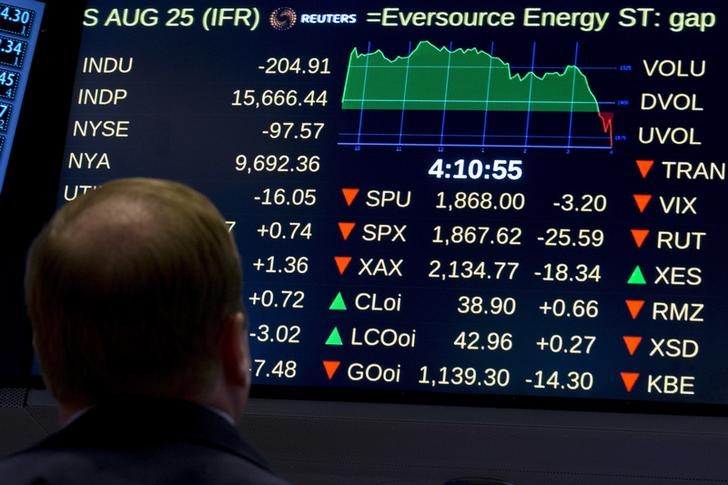By Geoffrey Smith
Investing.com -- Wall Street stayed lower in early trading on Monday as collapsing oil prices cast a pall over the rest of the market, but pared some losses at the start of the heaviest week in the current earnings season.
By 10:05 AM ET (1405 GMT), the Dow Jones Industrial Average was down 345 points or 1.4% at 23,898 points. The S&P 500 was down 1.1% and the Nasdaq Composite was down 0.6%. All three had posted solid gains on Friday amid growing hopes for a sharp rebound in activity as the Covid-19 pandemic passes.
The front-month May contract for U.S. crude futures, which expires on Tuesday, nearly halved in price to just over $10 a barrel, its lowest in over 21 years, as traders and producers ran out of places to store unsold oil. The June contract, where most open interest and volume is now concentrated, fell 8.6% to $22.88 a barrel.
Occidental Petroleum, highly indebted after its $35 billion takeover of Anadarko last year, led the losers on fears that low prices will hit its ability to service that debt. Occidental (NYSE:OXY) stock was down 8.7%. Exxon Mobil (NYSE:XOM) stock and Chevron (NYSE:CVX) stock both fell a little over 4%. Oil services company Halliburton (NYSE:HAL) stock, however, withstood early selling pressure to trade up 0.6%, as the market focused on its cost-cutting pledges, rather than the $1.0 billion net loss it posted for the first quarter and its warning of worse times ahead.
Analysts warned over the weekend that the relief rally in recent weeks had arguably gotten ahead of itself. TS Lombard research in London pointed out that the market was trading at an implicit p/e ratio of 24 times 2019 earnings, on the assumption of a 25% drop in cash earnings this year. A more conservative multiple of 16, which chief economist Charles Dumas considered more suitable in view of the low visibility, would result in fair value for the S&P 500 of around 1,900.
Goldman Sachs (NYSE:GS) analysts also advised more caution.
"While we believe that recent developments support the recent risk-on move, the more constructive pricing of growth and risks lowers the bar for disappointments," analysts led by Alessio Rizzi said in a note to clients on Monday. "Uncertainty around the strength and timing of the recovery is still high, and risk premia are likely to remain elevated at this stage."
United Airlines led airline stocks lower after it reported a $2.1 billion pretax loss due to the coronavirus pandemic. The airline also said it had applied for another $4.5 billion in government loans on top of the $5 billion in payroll grants and loans already disclosed. American Airlines (NASDAQ:AAL) stock fell 3.8% and Delta Air Lines (NYSE:DAL) stock fell 2.7% in sympathy.
A rare bright spot was chemical company DuPont (NYSE:DD), which rose 3.4% after reporting better-than-expected first-quarter numbers.
